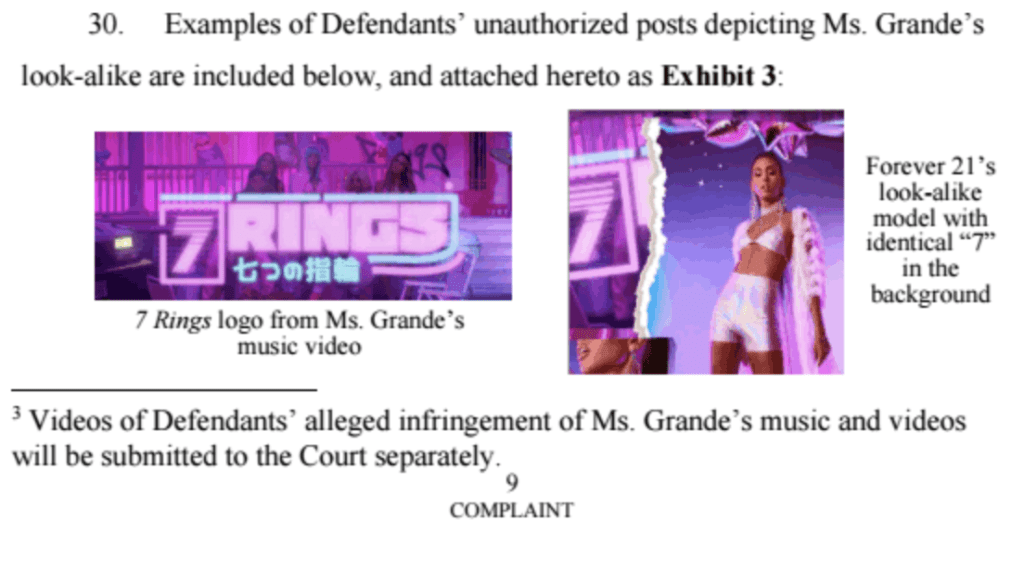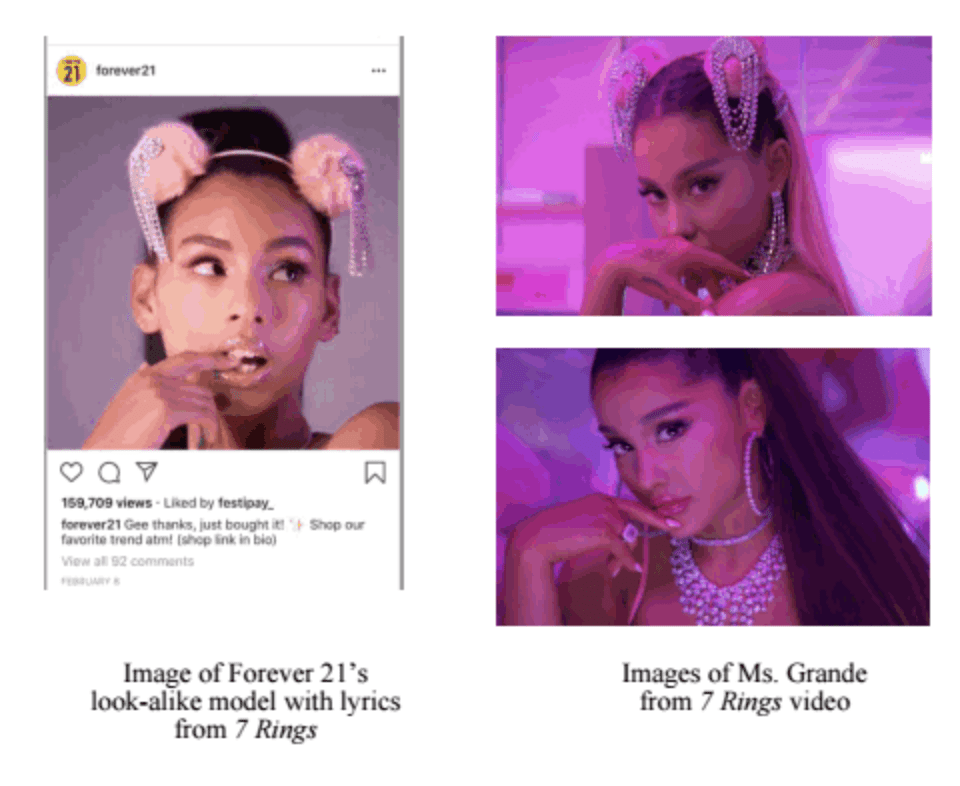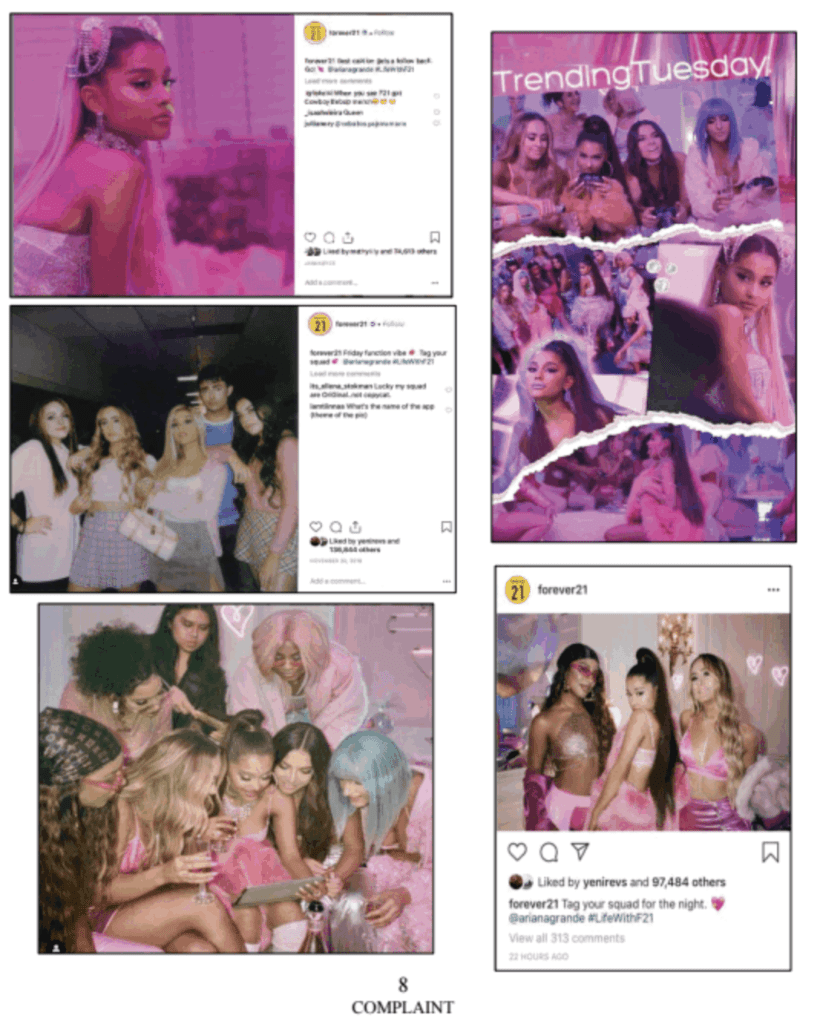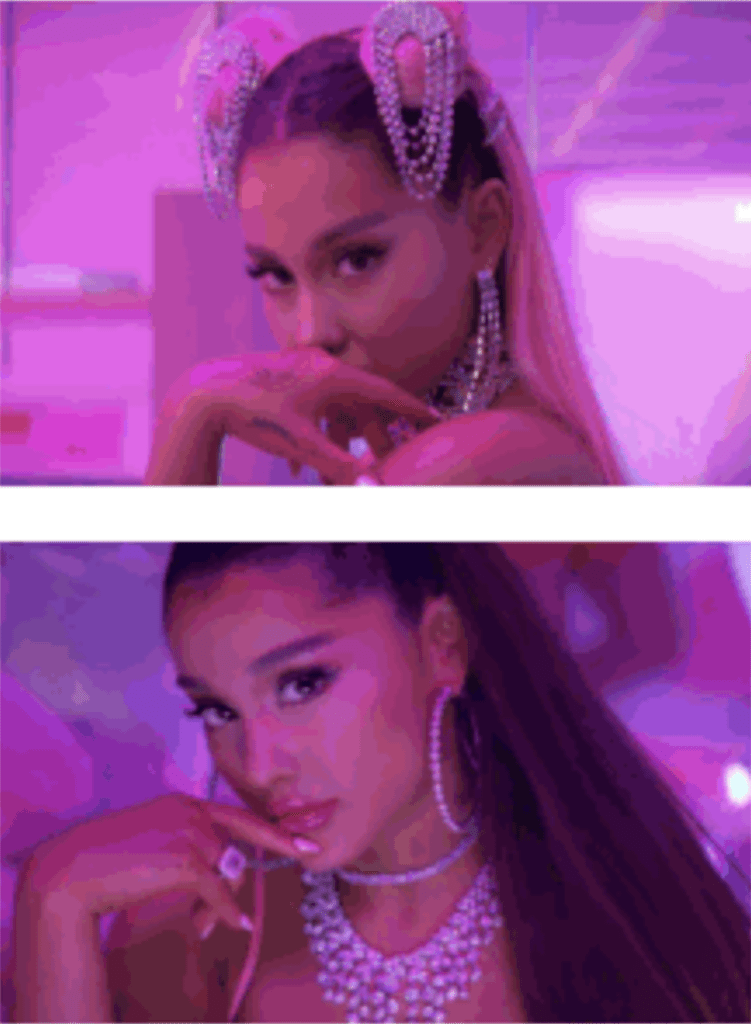Celebrity trademark infringement lawsuits can shine a spotlight on the complexities of intellectual property law, especially when they involve high-profile cases. In a notable case, singer Ariana Grande filed a lawsuit against Forever 21, Inc. and its subsidiaries in the Central District of California, alleging various forms of intellectual property infringement. This lawsuit not only highlights the importance of protecting celebrity trademark infringement rights but also underscores the legal nuances involved in copyright and publicity rights.
Background of the Celebrity Trademark Infringement Case
Ariana Grande’s lawsuit against Forever 21 centers on allegations that the fashion retailer used her likeness and references to her hit song “7 Rings” in their marketing materials without her permission. Specifically, the complaint details how Forever 21’s Instagram account featured images and videos that referenced Grande’s “7 Rings” music video. Additionally, the retailer allegedly used models that closely resembled the pop star, creating a false impression of endorsement.
Key Legal Allegations in Celebrity Trademark Infringement Cases
-
Celebrity Trademark Infringement under the Lanham Act (Title 15, U.S.C.) Grande alleges that Forever 21’s actions constitute trademark infringement under the Lanham Act, which protects against unauthorized use of a trademark that is likely to cause confusion about the source of goods or services. The use of Grande’s likeness and the references to her work are argued to create a false association with the brand.
-
Copyright Infringement under the 1976 Copyright Act (Title 17, U.S.C.) The lawsuit claims that Forever 21 infringed on Grande’s copyrighted material by using elements of her “7 Rings” music video. The Copyright Act protects original works of authorship, and Grande asserts that Forever 21 violated her exclusive rights to reproduce, distribute, and display her copyrighted content.
-
Violation of Right of Publicity under California Common Law California recognizes the right of publicity, which protects individuals from unauthorized commercial use of their name, likeness, or persona. Grande’s complaint alleges that Forever 21 exploited her likeness and persona without consent, thereby violating her publicity rights and creating a false endorsement.
Implications for Trademark and Intellectual Property Law
This lawsuit serves as a critical reminder for businesses about the importance of respecting intellectual property rights. Unauthorized use of a celebrity’s likeness or references to their work can lead to significant legal repercussions. For law firms focusing in intellectual property, this case provides several key takeaways:
- Thorough Legal Vetting: Companies must ensure that their marketing materials are thoroughly vetted for potential IP infringements.
- Celebrity Trademark Infringement and Endorsements: Proper agreements and permissions are essential when leveraging a celebrity’s likeness or work.
- Understanding Federal and State Laws: Businesses must be aware of both federal IP laws, like the Lanham Act and the Copyright Act, as well as state-specific laws like California’s right of publicity.
Ariana Grande’s lawsuit against Forever 21 underscores the complexities and importance of intellectual property rights protection. For businesses and legal practitioners, this case highlights the necessity of respecting trademarks, copyrights, and publicity rights to avoid costly legal battles and potential damages.
Some of the promotional materials included in the complaint are below:



Entrepreneurs, technology startups, and other online and offline retailers looking to reference famous celebrities should legally clear the content with an experienced intellectual property, entertainment and trademark attorney.
As this lawsuit between Ariana Grande and Forever 21, Inc. illustrates, the recognizable intellectual property rights in the right of publicity, intellectual property rights clearance can help reduce legal risk in connection with the unclear line between infringement and lack thereof when a company uses, for example, talent that looks similar to a famous person, or “lookalikes”.
In addition, use or overt reference to a single celebrity’s body of work may create a false association, and otherwise, explicit use of a celebrity’s name or image is not necessarily required to constitute intellectual property infringement.
If the material conjures up other people’s intellectual property, particularly in advertising speech as is the case here, the potential exposure to lawsuit for trademark infringement, intellectual property infringement, and violation of right of publicity is present, and careful legal review by an experienced trademark and intellectual property attorney is critical.
Contact Us for Expert IP Legal Advice
Navigating the complexities of trademark law can be challenging, but you don’t have to do it alone. At L.A. Tech and Media Law Firm we consult clients on celebrity trademark infringement and in technology startup law and copyright consultations. Our experienced attorneys are here to guide you through every step of the trademark registration process, from conducting thorough conflict checks to responding to USPTO refusals and handling TTAB disputes.
Don’t let potential trademark conflicts derail your business plans. Contact us today for a consultation and let us help you secure your brand’s future. Reach out via our secure contact form or visit our website at www.techandmedialaw.com.
Let us put our expertise to work for you and ensure your trademarks are protected and your business is set up for success.
FAQs
Q1: What is trademark infringement under the Lanham Act? Trademark infringement under the Lanham Act involves unauthorized use of a trademark that causes confusion about the source of goods or services.
Q2: What constitutes a violation of the right of publicity in California? In California, a violation of the right of publicity occurs when a person’s name, likeness, or persona is used for commercial purposes without their consent.
Q3: How can businesses avoid IP infringement claims? Businesses can avoid IP infringement claims by conducting thorough legal vetting of their marketing materials, securing proper permissions for using celebrity likenesses, and staying informed about relevant federal and state IP laws.
Interesting External Links
By understanding these processes and principles, businesses can better navigate the trademark registration process, ensuring their brand’s protection and longevity.


